(捷进英语2)Unit3-电子教案
捷进英语综合教程2unit3答案

捷进英语综合教程2unit3答案1、Wang Dong usually gets up at 6:00 _______ he can catch the early school bus. [单选题] *A. as ifB. so that(正确答案)C. untilD. after2、What did you _______ at the meeting yesterday? [单选题] *A. speakB. tellC. say(正确答案)D. talk3、Jim, it’s dark now. Please _______ the light in the room. [单选题] *A. turn on(正确答案)B. turn upC. turn offD. turn down4、Henry lives happily with his three cats. _______ of them are part of his family. [单选题] *A. NoneB. BothC. All(正确答案)D. Neither5、—Could you take out the rubbish, Jim?—______. I have too much homework to do. You can ask Sally to do it. ()[单选题] *A. Sorry, I can’t(正确答案)B. No problemC. I disagreeD. No, thanks6、Lucy _______ at 7:00 every day. [单选题] *A. go to schoolB. goes to school(正确答案)C. to go to schoolD. went?to?school7、You needn’t _______ me. I’m old enough to take care of myself. [单选题] *A. worry about(正确答案)B. write downC. put awayD. wake up8、—_____ will the bus arrive? —In four minutes. [单选题] *A. How longB. How oftenC. How soon(正确答案)D. How far9、1——May I help you? You seem to be having some problems.——_______ , thanks. Ithink I can manage. [单选题] *A. All rightB. No problemC. It’s all right(正确答案)D. There’s no way10、The red jacket is _______ than the green one. [单选题] *A. cheapB. cheapestC. cheaper(正确答案)D. more cheap11、If you had told me earlier, I _____ to meet you at the hotel. [单选题] *A. had comeB. will have comeC. would comeD. would have come(正确答案)12、We often go to the zoo _______ Saturday mornings. [单选题] *A. atB. inC. on(正确答案)D. of13、22.Will there ________ any schools in the future? [单选题] *A.isB.areC.amD.be(正确答案)14、He usually ________ at 6:30 a.m. [单选题] *A. gets toB. gets up(正确答案)C. gets overD. gets in15、Last year Polly _______ an English club and has improved her English a lot. [单选题] *A. leftB. sawC. joined(正确答案)D. heard16、If we want to keep fit, we should try to _______ bad habits. [单选题] *A. keepB. haveC. getD. get rid of(正确答案)17、He couldn’t ______ the maths problem without your help. [单选题] *A. work out(正确答案)B. work atC. work forD. work with18、39.—What do you ________ my new dress?—Very beautiful. [单选题] *A.look atB.think aboutC.think of(正确答案)D.look through19、She returns home every year to _______ the Spring Festival. [单选题] *A. celebrate(正确答案)B. shareC. watchD. congratulate20、You can distinguish the twins very easily, _____Tom is quite while Jack is active. [单选题] *A. soB. butC. for(正确答案)D. and21、I think you should buy this novel. It is really worth _____. [单选题] *A. reading(正确答案)B. being readC. readD. to read22、51.People usually ________ the prices before they buy something. [单选题] * A.receiveB.payC.spendD.compare(正确答案)23、John suggest _____ anything about it until they found out more facts. [单选题] *A not to sayB. not sayC to say notD not saying(正确答案)24、pencil - box is beautiful. But ____ is more beautiful than ____. [单选题] *A. Tom's; my; heB. Tom's; mine; his(正确答案)C. Tom's; mine; himD. Tom's; my; his25、97.Go ______ the square and you will find the theatre. [单选题] *A.aboveB.atC.across(正确答案)D.on26、—The weather in Shanghai is cool now, ______ it? —No, not exactly. ()[单选题] *A. doesn’tB. isC. isn’t(正确答案)D. does27、Both Mary and Linda don't care for fish. [单选题] *A. 喜欢(正确答案)B. 关心C. 照料D. 在乎28、It _______ him ten minutes to solve the problem. [单选题] *A. spentB. took(正确答案)C. costD. paid29、94.—Let’s go out for a picnic on Sunday.—________. [单选题] * A.Nice to meet youB.Here you areC.The same to youD.Good idea(正确答案)30、Lily is a very_____person and never wastes anything. [单选题] *A.generousB.economical(正确答案)C.economicD.efficient。
【人教版】高中英语必修二:Unit 3 Computers 教案
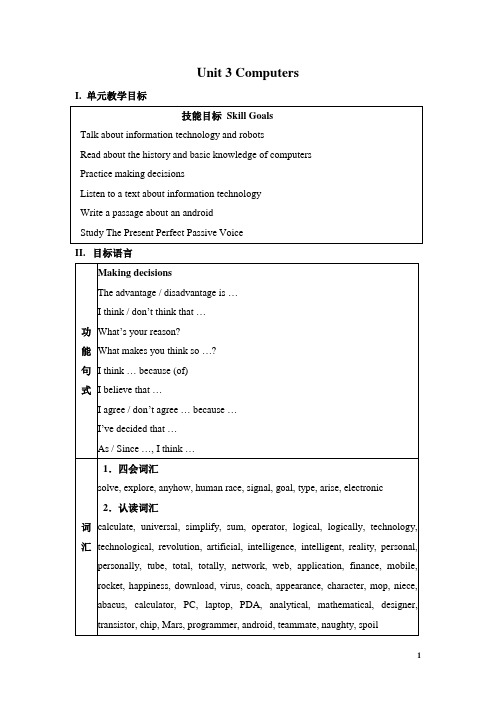
Unit 3 Computers I. 单元教学目标II. 目标语言III. 教材分析与教材重组1. 教材分析本单元以computers为话题,旨在通过单元教学,综合听、说、读、写等多种形式,使学生了解计算机和信息技术的产生和发展过程及其在我们的学习、工作、娱乐等生活中所起的重要作用,激发学生对信息技术的兴趣。
1.1 Warming up提供几幅与计算机有关的图片,形象地说明了计算机的发展历程,并用三个问题引发学生对这一话题的思考,从而起到热身的作用。
1.2 Pre-reading根据文章内容预设问题,检查学生对computers相关知识及应用的了解。
学生对computers的了解可能参差不齐,这更能激发学生想获取更多知识的欲望,从而引出下面的阅读文章——WHO AM I?。
1.3 Reading中以别致的标题WHO AM I?引起学生的好奇心,使学生迫不急待地阅读这篇文章,并判断出“I”是computer,从而对文章的内容印象更深刻。
文章以第一人称的形式按时间先后顺序讲述了computers的产生、发展和现状,并用拟人化的口吻表达了computers乐于为人类服务的精神。
1.4 Comprehending 1 通过scanning的方式完成反映计算机发展历程的时间进程;2 通过填表的形式帮助学生宏观梳理文章结构,找出每个段落的主题句(论点)及具体的支持性论据;3 是读后讨论,要求学生结合自己的生活实际讨论计算机如何改变了我们的生活。
1.5 Learning about language分词汇(Discovering useful words and expressions)和语法(Discovering useful structures)两大部分。
Discovering useful words and expressions 1 根据单词释义写出相对应的词汇,考查学生对WHO AM I? 文章中的重要词汇及短语的理解。
人教版高中英语必修2《Unit3 Computers Reading》教学设计
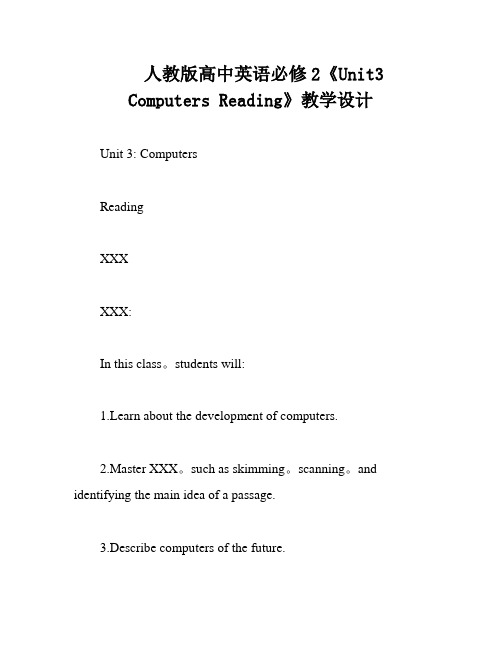
人教版高中英语必修2《Unit3Computers Reading》教学设计Unit 3: ComputersReadingXXXXXX:In this class。
students will:1.Learn about the development of computers.2.Master XXX。
such as skimming。
scanning。
and identifying the main idea of a passage.3.Describe computers of the future.Pre-class n:Useful Phrases:1.Calculating machine2.Simplify3.Analytical machine4.Card with holes5.XXX6.Artificial intelligence7.Universal machine8.Transistor9.Memory10.ork11.World Wide WebIn-class n:d 1: Fast-ReadingXXX 1: XXX1.Look through the passage to XXX speaker.2.XXX the type/style of the text.A。
nB。
nXXXD。
XXXTask 2: Find and underline the topic XXX.Para 1: The Importance of Good Study HabitsGood study habits are essential for success in school。
Without them。
students may struggle to keep up with their coursework and may not perform as well on XXX。
捷进英语 Unit 3
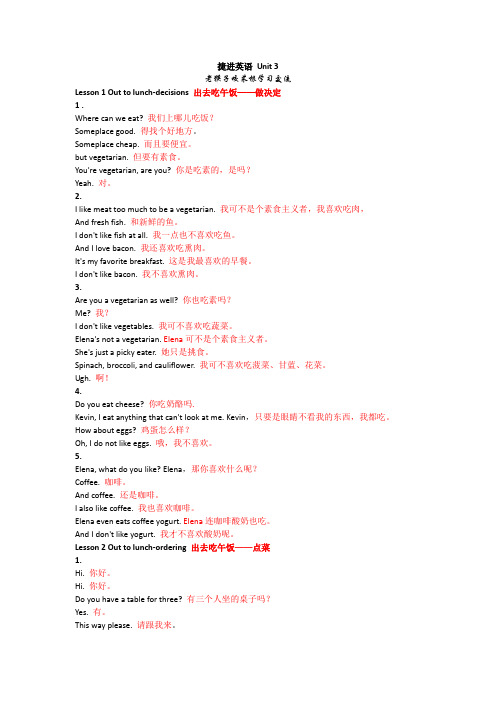
捷进英语Unit 3老猴子咬菜根学习交流Lesson 1 Out to lunch-decisions 出去吃午饭——做决定1 .Where can we eat? 我们上哪儿吃饭?Someplace good. 得找个好地方。
Someplace cheap. 而且要便宜。
but vegetarian. 但要有素食。
You're vegetarian, are you? 你是吃素的,是吗?Yeah.对。
2.I like meat too much to be a vegetarian. 我可不是个素食主义者,我喜欢吃肉,And fresh fish. 和新鲜的鱼。
I don't like fish at all. 我一点也不喜欢吃鱼。
And I love bacon. 我还喜欢吃熏肉。
It's my favorite breakfast. 这是我最喜欢的早餐。
I don't like bacon. 我不喜欢熏肉。
3.Are you a vegetarian as well? 你也吃素吗?Me? 我?I don't like vegetables. 我可不喜欢吃蔬菜。
Elena's not a vegetarian. Elena可不是个素食主义者。
She's just a picky eater. 她只是挑食。
Spinach, broccoli, and cauliflower. 我可不喜欢吃菠菜、甘蓝、花菜。
Ugh. 啊!4.Do you eat cheese? 你吃奶酪吗.Kevin, I eat anything that can't look at me. Kevin,只要是眼睛不看我的东西,我都吃。
How about eggs? 鸡蛋怎么样?Oh, I do not like eggs. 哦,我不喜欢。
5.Elena, what do you like? Elena,那你喜欢什么呢?Coffee. 咖啡。
基础模块_2_unit_3电子教案.
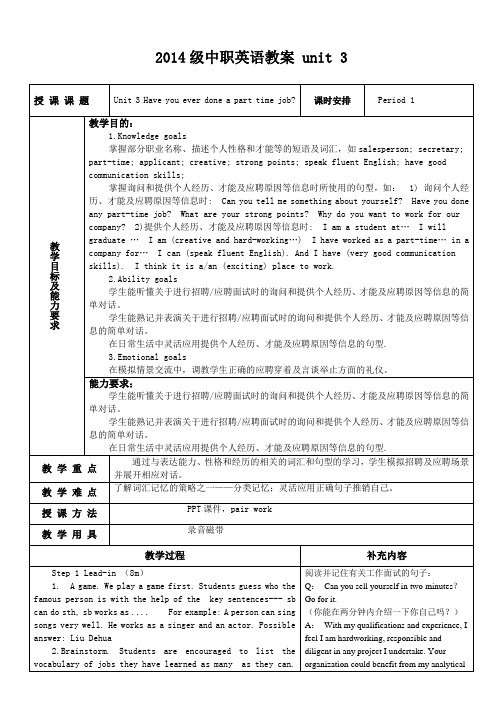
教学重点
通过与表达能力、性格和经历的相关的词汇和句型的学习,学生模拟招聘及应聘场景并展开相应对话。
教学难点
了解词汇记忆的策略之一——分类记忆;灵活应用正确句子推销自己。
授课方法
PPT课件,pair work
教学用具
录音磁带
教学过程
补充内容
Step 1 Lead-in(8m)
1. A game. We play a game first. Students guess who the famous person is with the help of the key sentences--- sb can do sth, sb works as .... For example: A person can sing songs very well. He works as a singer and an actor. Possible answer: Liu Dehua
英语优秀教案(人教版):必修二(Unit3 Computers--Period1 Reading)

Period 1 ReadingThe General Idea of This Period:This period includes Warming up,Reading and Comprehending of Unit 3.It introduces the history and development of computers.From this period the students will learn more about computers.Meanwhile they can learn some reading strategies such as skimming and scanning.Teaching Aims:1.Train the students’ reading ability.2.Learn some useful words and expressions.3.Learn more about computers.Teaching Important Points:1.Help the students to understand the passage better.2.Learn how to use some important words and phrases in this passage.Teaching Difficult Points:1.How to help the students improve their reading ability and understand the passage better.2.Learn how to use some important words and phrases in this passage.Teaching Methods:1.Skimming the passage to get the general idea of the text.2.Scanning to get the details from the passage.3.Explanations and practice to help the students master some language points.4.Discussion to help the students understand better what they’ve learned and to use the knowledge they’ve learned in this period.Teaching Aids:1.A tape recorder.2.A multimedia.Teaching Procedures:Step 1 Warming up1.Greeting the students as usual.2.Introduce the topic of computersShow the five pictures (an abacus,a huge computer,a calculator,a PC,a notebook computer)and get the students name them in English.Through this task,students can have a general idea about what they are going to learn.Besides,students are expected to have a discussion about what they have in common while looking at them.And they are required to use the given expressions in their discussion to express their ideas.T:Boys and girls,today I am going to introduce some machines to you.Now let’s see whether you can name them in English correctly,and talk about them.Now work together with your partners and try to find out what they have in common.Two minutes late,five students are asked to talk about them in class.S1:An abacus is an old calculating machine used in China until now.S2:A huge computer is built to solve some mathematical problems.But,in my opinion,it is too big.S3:A calculator is a new calculating machine which can solve a large number mathematical problems.And I think it is very convenient to carry and use,so we often use it.S4:A PC is a personal computer,which can solve all kinds of problems and is widely used in offices,schools,shops,at homes,etc.now.S5:A notebook computer is a kind of useful computer which can be taken conveniently like a notebook.But I think it is too expensive.T:Quite good.It seems that you are all quite familiar with these machines.But can you tell what they have in common?Any volunteers?S6:Let me try.I think they all calculate something.They can deal with some maths problems.S7:I believe that they are our good friends.With their help we can finish our work quickly.S8:The 21th century is the century of information technology.As middle school students,we should try to learn how to use computers.T:Well,your opinions are all right.Indeed,these machines all can calculate something.What’s more,from the abacus to the notebook computer,there is a long way.But now computers have already changed our lives greatly.But do you know more about computers and can you say something about how computers have changed our lives.Step 2 Pre-readingShow the questions on the screen.T:Now,please have a discussion first,and then I’ll ask some students to report your work.After a few minutes.T:Now,who would like to answer the first question?V olunteer!S9:I’ll have a try.I know that computers have developed from large machines.They have been made smaller and smaller,but work faster and faster.I really can’t imagine what they will be like and whether they can take the place of human beings in the future.T:Yes,this is really a big problem.I think you are all interested in computers,you may go on studying computers,and perhaps one day you will design your own computers and become the masters of computers.OK!Next question!S10:I think computers have changed our lives greatly.We use computers widely in our study,in our work.You are using the computer to teach us English,aren’t you?S11:In my opinion,in the modern society,using the computers means grasping a tool ofcontrolling the world.We may communicate with each other from a very long distance.In short,we can not live freely without them.T:I agree with you.The computers are becoming more and more important in our lives.But learning more about computers is also important,isn’t it?OK,let’s come to the reading passage “Who am I”.Step 3 ReadingTask 1.Skim the passage for the general idea.T:Boys and girls,you will be given two minutes to skim the passage and try to find out who “I”am and get the general idea of this passage.After two minutes.T:Time is up.Who would like to tell us who “I”am and give the general idea of the text to the class?V olunteer!S12:Of course,“I”am the computer.The passage is mainly about the history and development of computers.S13:The passage is also about the relationship of computers and humans.Task 2.Scan for the details.T:Boys and girls,you will be given two more minutes to scan the passage and try to find out the answers to the following questions.Let’s see who can find out the answers most quickly and correctly.1.Where were you in 1642?2.What happened to you in 1822?3.What were you called in 1936?4.What did you get in the 1960s?5.What happened to you in the 1970s?T:Have you finished?S14:I have.I was in France as a calculating machine in 1642.In 1822,I was built as an Analytical Machine by Charles Babbage.I was called “a universal machine”in 1936,as I could solve any mathematical problem.In the 1960s,I was given a family connected by a network,so that I could share information with others and we could talk to each other.In the 1970s,I was brought into people’s homes.T:You are so quick-minded that in such a short time you could find out all the answers to the questions.Your mind really works like a computer!Step 4 ComprehendingTask 3.Fill in the timeline to remember the facts.T:But can you memorize facts like a computer?I am afraid you can not.But let’s try to remember the facts in the passage by filing in the timeline on Page 19,which,I am sure,will help you remember the facts easily.Suggested answers:Timeline1642:The computer began as a calculating machine.1822:The Analytical Machine was built by Charles Babbage.1936:Alan Turing wrote a book to describe how computers could be made.1960s:Computers had new transistors and became smaller.1960s:The first family of computers connected to each other.1970s:Computers were brought into people’s homes.Now:Computers connect people all over the world together.T:Have you finished?If so,please check your answers yourself.I’m sure all of you have got them right.Now you can retell the history of computers easily with the help of the timeline,can’t you?Please have a try,boys and girls!Step 5 Homework1.Recite the key sentences.2.Prepare for Learning About Language.3.Try to retell the text using about 100 words.Step 6 The Design of the Writing on the BlackboardUnit 3 ComputersPeriod 1The general idea of the text:Questions1.Where were you in 1642?2.What happened to you in 1822?3.What were you called in 1936?4.What did you get in the 1960s?5.What happened to you in the 1970s?Language points:1.in common/have... in common (with)...2.in one’s opinion3.deal with4.simple-minded5.“as”and “with”6.“There were times when... ”Step 7 Record after Teaching。
最新人教版高一英语必修2-Unit3-Computers全单元教案
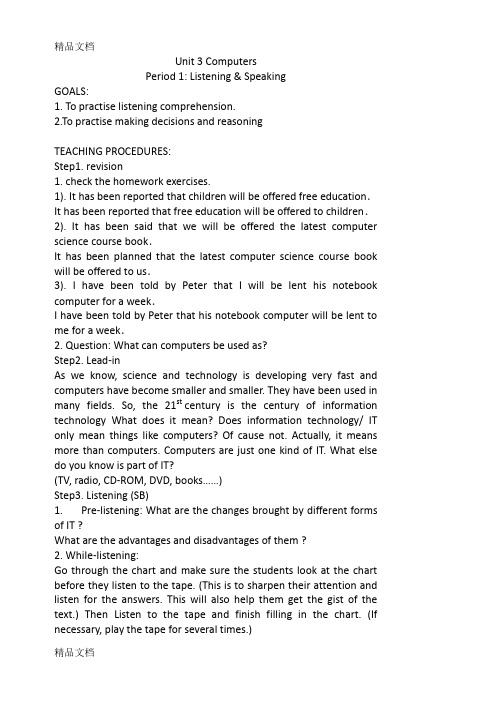
Unit 3 ComputersPeriod 1: Listening & SpeakingGOALS:1. To practise listening comprehension.2.To practise making decisions and reasoningTEACHING PROCEDURES:Step1. revision1. check the homework exercises.1). It has been reported that children will be offered free education.It has been reported that free education will be offered to children.2). It has been said that we will be offered the latest computer science course book.It has been planned that the latest computer science course book will be offered to us.3). I have been told by Peter that I will be lent his notebook computer for a week.I have been told by Peter that his notebook computer will be lent to me for a week.2. Question: What can computers be used as?Step2. Lead-inAs we know, science and technology is developing very fast and computers have become smaller and smaller. They have been used in many fields. So, the 21st century is the century of information technology What does it mean? Does information technology/ IT only mean things like computers? Of cause not. Actually, it means more than computers. Computers are just one kind of IT. What else do you know is part of IT?(TV, radio, CD-ROM, DVD, books……)Step3. Listening (SB)1. Pre-listening: What are the changes brought by different forms of IT ?What are the advantages and disadvantages of them ?2. While-listening:Go through the chart and make sure the students look at the chart before they listen to the tape. (This is to sharpen their attention and listen for the answers. This will also help them get the gist of the text.) Then Listen to the tape and finish filling in the chart. (If necessary, play the tape for several times.)Say: After listening to their talk, we know all kinds of IT have both1) (pair work): decide which type of IT is best for you to use right now. Make your choice and give your reasons by using the following expression_r_rs.I think that….In my opi nion, ….I believe that….I agree because….I disagree because….I’ve decided that….2) (group work): Discussion :Computers are useful and have brought us lots of good things, but they also cause bad effects. What attitude should we have towards the computer? (Make good use of it but never get trapped by it.) Step4. Speaking1. Pre-speakingSay: From what we have learn, we should admit that computers and the web have a great influence on the school education as well as people’s life. It has come into people’s everyday life and many families hold computers in their homes. Now there is a task for you.2. While-speaking1) Situation: You have been asked by your parents to help choose computers for your home. You and your friend have looked at several computers. Talk about the special things each computer can do. Make a decision about which kind of computer to buy and explain why.Information input: Show students some pictures of different computers (desktop computer & laptop computer & …)Language input: Useful expression_r_rs (Repeat it to strengthenstudents’ ability of use it.)(Pair work )Use the expression_r_rs to support your opinion or challenging other’s opinions.2) Oral report: (individual work )Do an oral report to your father and start your report like this: I looked at many different computers. The one I have chosen is the PEP personal computer. One of the main reasons is that it is suitable for homes. I found that…3. Post-speakingConclusion—What useful expression_r_r do we use to make a decision and reason?(In this way, they can review and use the words and phrases again.) Step5. HomeworkPage 22. writing: Write a report about your choice and try to use the present perfect passive voice as well as the useful words and expression_r_rs that have been mentioned above. in your report.Period 2: Reading and speaking & Writing Goals:1. Learn a reading passage to learn about a football android called Andy.2. Improve students’ reading ability.3. Design an android.4. Write a passage about the problems that the android might have while he/she is serving people. Teaching procedures:Step1: Lead-inShow the first picture and tell the students that computers could be put into androids or robots. Present “android”.Tell the students: Androids are always with us! The students may disagree. Show pictures of Atom and Doraemon. Say: they are androids with magical power.Continue to show pictures of nursery maid androids and tell the students androids can be made to look after humans. Then ask: But can you imagine androids can play football? Maybe you are curious about it. I will show you a video that androids play football.Let the students watch the video and tell them: oday I would like to introduce an android family member to you .His name is Andy. Present the reading passage’s topic: Andy---the Android.Step2: Reading:Let the students read the passage. Carry out the tasks below: Task1: Answer the questions below:1. Who is Andy? What is he good at?(He is an android. And he is good at playing football)2. What helps him to move and think like a human?(His computer helps him to move and think like a human.)3. What does Andy think about the team who beat them last year? Why?(She thinks the team cheated because they had a new kind of programmer, which had just been developed before the competition.)4. What does the programmer do to Andy?(She programs me with all the possible moves she has seen while watching human games.)Task2: Fill in the blanksThe story is about the _____ called ____, who is good at____________. And his__________ makes him think and move like a ______. However, they _____ in the _________ hosted in the USA, because the other team had a new kind of_______. After that, he will ask his programmer to improve his _________ and _______ some new moves.Task3: Language points:1. I think we can work together to create even better software. even = much 用于强调比较的程度2. In a way, my programmer is like my coach.in a way 在某种程度上…in the way 挡道,造成障碍in this way 用这种方法Fill in the blank:1). ________it was one of our biggest mistakes.2). You can finish your work .3). Your bike is .Move it away.3. In this way, I can make up new moves.make up 编写,补上4. After all, with the help of my computer brain which never forgets anything, intelligence is what I’m all about.after all 毕竟with the help of sb./sth. 在…的帮助之下= with one’s/ sth’s help Step3 SpeakingTell the students that we already have many different kinds of androids in our daily life. Show some pictures of androids for different purposes---maid, adventure and work.Then say to the students: Let’s design an android of our own! The following questions and expression_r_rs can help you:*What would you like it to look like?*What are some of the things you would like it to do?*Do you want it to be like a man or a woman, or neither?*How much would it cost?......Get the students to use the following sentences for discussion:I think that…What’s your reason?In my opinion…I have decided that…Sample:A: What would you like your android to look like?B : In my opinion it should look like a bird.A: That sounds interesting. What will it do for you?B: I think it can sing beautiful songs for me day and night.A : Oh, yes! That sounds good. How much is it?B: It doesn’t cost much money because I will make it by myself.A: Really?! Do you want it to be a man or woman, or neither?B : I want it to be a beautiful girl named Kelly.A: Please show it to us some day.B: Oh, No money no talk.Step4 Pre-writingSay: Imagine what problems and delights this android might have to deal with while it is serving you. Try yourself in someone else’s shoes is an important way of understanding how other people feel.Then discuss: You are an android. You work for a family with one child who is very spoiled. The parents want you to do everything for them. The parents are nice, but they often ask you to watch over their child. How do you feel? What would you do if the child asked you to do his/her homework for him/her? Would you ever tell the child “no”?Step5 WritingSay: Write a passage about the result of your discussion! It should contain:What do you have to do?What is the child like?What is the par ents’ requirement of the child?What do the parents want you to do?What does the child want you to do?Then what will you do? How do you feel?Sample writing:Hello everybody, my name is Liu Yan.I am a 321 model android.I work for the Li family. Mr and Mrs Li work very hard too.Mr Li is an architect and designs great tall apartment blocks.Mrs Li is a doctor and has to look after many patients.I remember all the plans for Mr Li's projects and can tell Mrs Li which drugs are the best to give any particular patient. And I also look after their library. I store all the books that they borrow from their school or friends in my brain.Of course my brain is as large as a mountain, so work like that is no trouble to me.I really eat books just like people eat food.The Lis have a child who is very spoiled. He needs me to remember all his school textbooks so that I can do his homework for him.Hejust gives me the information on the subject, what has to be done and the page numbers and I get on with it while he enjoys himself with his friends.Sometimes I don't think it is right to do his homework for him — it's somewhat cheating. However, his parents are very concerned at the pressure of work in school these days.The child has too much homework to do. They like him to go to the key school but they also want him to be able to have hobbies, learn to swim and keep fit! Poor child!So they consider me the most important person in the family after themselves.I am always introduced to their friends and play with visiting children.I am the perfect family academic aid and, although I was not cheap to buy, Mr Li says I was worth every yuan!Step6 AssessmentGet the students to assess their writing ability according to the following the questions:1. Is your composition well developed?2. Are your ideas well organized to the point?3. Do you have a good choice of words and idioms in your writing?4. Do you get a good mastery of complex structures of language?5. What kind of mistakes have you made in your writing?Step5: HomeworkWrite about your discussion. You may begin like this:Hello, everyone. My name is ___. I’m 321 model android. I work for the Li family….Period 3: learning about Language---the Present Perfect Passive VoiceGoals: 1. Learn the Present Perfect Passive Voice.2. Help the students master the way of using the correct voice, telling the differences between the active voice and the passive voice. Teaching Procedures:Step 1: Revision and lead-in1. Check the homework firstEx1:1 totally2 revolution3 artificial intelligence4 birth5 simple-minded6 go by7 deal with 8 network 9 truly 10 anywayEx2:revolution; network; went by; totally; truly; simple-minded; Anyway; deal withEx3:1 totally2 amazed3 exciting4 excited5 cheaply6 unlucky2. Lead-inSay: Are you familiar with these computers? Can you call them? (ask the Ss to distinguish different types of computers.)Do you know these new inventions of computer ?A wrist-worn PC has been invented recently.A pen-like computer has already been developed.(show them some pictures and ask them to make some sentences , using the Present Perfect Passive Voice.)Eg: It’s rather a hot day today! Would you like to have a swim after school ?Have you ever swum in the Blue Water World(蓝色水世界)in the Oriental Suntown (东方太阳城) which has been set up in Taizhou? There a beautiful swimming pool has been built .Many high buildings have been set up.Lots of flowers and trees have been planted.A new bridge has be en completed….Step2: DiscoveringAsk the Ss to discover whether these sentences have something in common.. Help them to learn the useful structure : the Present Perfect Passive Voice.Step3: Discussion : learning the structureGive some explanations1构成:主动语态被动语态现在完成时 have/has done----------àhave/has been doneHe has been sent to study the new technology in the company.The dirty clothes have not been washed.Have the windows been cleaned?How many shopping centers have been built in this city?2. 只有及物动词才有被动语态,不及物动词(词组)没有被动语态, 如:happen, take place,die, appear, disappear, fail, remain, lie, last, sit ,stand, break out, come true, belong to等.如:What has happened to your brother?3.但许多不及物动词加介词或副词构成的短语动词,相当于及物动词,也可以有被动语态。
(捷进英语2)Unit3-电子教案
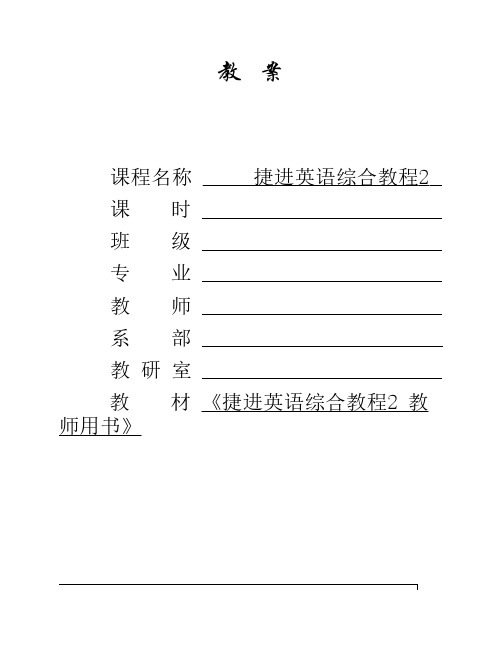
教案
课程名称
捷进英语综合教程2
课时
班级
专业
教师
系部
教研室
教 材 《捷进英语综合教程2 教 师用书》
Teaching Plan
教学 Unit 3 Making a Difference
单元
单元 主题
教 学 内 容
ASL and the Ice Bucket
Challenge
课
Volunteer projects around the 时安 8
The first two vocabulary tasks draw on topics vocabulary from the text and work on word formation. Thematically these all link
Reading (阅读)
students understanding of large numbers. the grammar section looks at various comparative structures.
Reading for doing
Ss read an advert related to charities and good causes around the world.
short text and image on an issue related to water related issues. They look at problems related to water around the world. If you have time you could bring in additional information or videos from WaterAid’s website or a similar charity.
(捷进英语2)Unit6电子教案(2020年8月整理).pdf
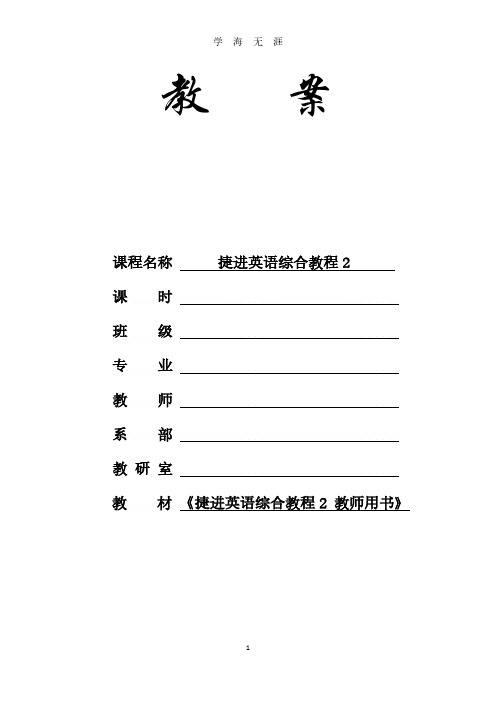
课后学习设计
◆ Finish all the tasks in Unit 6. ◆ Read the two texts in this unit again and try to summarise
their contents. ◆ Prepare a PPT presentation on your survey result in Task 3 of
2
学海无涯
Reading for learning
using them to help
could simply write the three headings on the
the student
board and ask students to write their own
understand the
The second vocabulary task can be easily extended by asking students to give written or spoken answers to each question.
◆ Vocabulary and Grammar
The Grammar Focus part looks at the passive voice in the present and past simple.
summary sentences.
text. It also encourages students to
The first vocabulary tasks draw on topic vocabulary from the text.
produce a brief summary of the text.
人教版高中英语必修2《Unit 3 Computers》教案
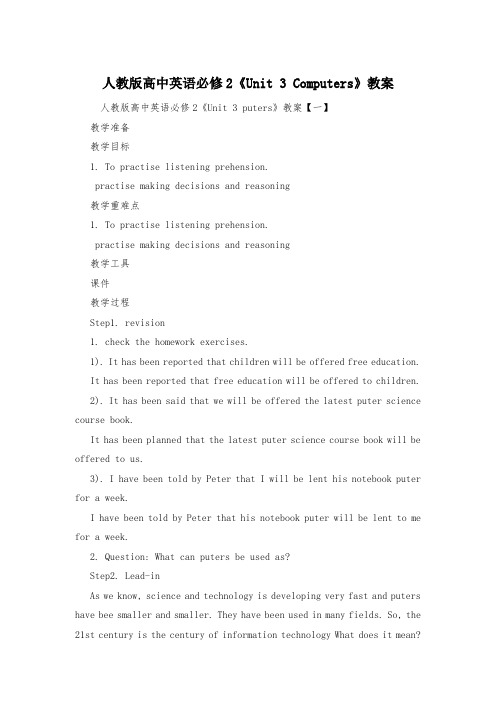
人教版高中英语必修2《Unit 3 Computers》教案人教版高中英语必修2《Unit 3 puters》教案【一】教学准备教学目标1. To practise listening prehension.practise making decisions and reasoning教学重难点1. To practise listening prehension.practise making decisions and reasoning教学工具课件教学过程Step1. revision1. check the homework exercises.1). It has been reported that children will be offered free education. It has been reported that free education will be offered to children.2). It has been said that we will be offered the latest puter science course book.It has been planned that the latest puter science course book will be offered to us.3). I have been told by Peter that I will be lent his notebook puter for a week.I have been told by Peter that his notebook puter will be lent to me for a week.2. Question: What can puters be used as?Step2. Lead-inAs we know, science and technology is developing very fast and puters have bee smaller and smaller. They have been used in many fields. So, the 21st century is the century of information technology What does it mean?Does information technology/ IT only mean things like puters? Of cause not. Actually, it means more than puters. puters are just one kind of IT. What else do you know is part of IT?(TV, radio, CD-ROM, DVD, books)Step3. Listening (SB)1. Pre-listening: What are the changes brought by different forms of IT ?What are the advantages and disadvantages of them ?2. While-listening:Go through the chart and make sure the students look at the chart before they listen to the tape. (This is to sharpen their attention and listen for the answers. This will also help them get the gist of the text.) Then Listen to the tape and finish filling in the chart. (If necessary, play the tape for several times.)Say: After listening to their talk, we know all kinds of IT have both disadvantages and check the answers together.Type of IT Advantages DisadvantagesTV You can both listen and watch. You cannot write to friends.Web You can find information. It is very expensive.Radio You can listen to English. You cannot watch a film.Book You can get information. Sometimes it is out of date.3. Post-listening:1) (pair work): decide which type of IT is best for you to use right now. Make your choice and give your reasons by using the following expressions.I think that.In my opinion, .I believe that.I agree because.I disagree because.Ive decided that.2) (group work): Discussion :puters are useful and have brought us lots of good things, but they also cause bad effects. What attitude should we have towards the puter? (Make good use of it but never get trapped by it.)Step4. Speaking1. Pre-speakingSay: From what we have learn, we should admit that puters and the web have a great influence on the school education as well as peoples life. It has e into peoples everyday life and many families hold puters in their homes. Now there is a task for you.2. While-speaking1) Situation: You have been asked by your parents to help choose puters for your home. You and your friend have looked at several puters. Talk about the special things each puter can do. Make a decision about which kind of puter to buy and explain why.Information input: Show students some pictures of different puters (desktop puter laptop puter )Language input: Useful expressions (Repeat it to strengthen students ability of use it.)Supporting an opinion Challenging an opinionI think that , because Perhaps, but what if / about ?First, Have you thought about ?One reason is that What makes you think that ?I think it is better because I dont like it because.(Pair work )Use the expressions to support your opinion or challenging others opinions.2) Oral report: (inpidual work )Do an oral report to your father and start your report like this: I looked at many different puters. The one I have chosen is the PEP personal puter. One of the main reasons is that it is suitable for homes. I found that3. Post-speakingConclusionWhat useful expression do we use to make a decision and reason?(In this way, they can review and use the words and phrases again.) Step6 Pre-writingSay: Imagine what problems and delights this android might have to deal with while it is serving you. Try yourself in someone elses shoes is an important way of understanding how other people feel.Then discuss: You are an android. You work for a family with one child who is very spoiled. The parents want you to do everything for them. The parents are nice, but they often ask you to watch over their child. How do you feel? What would you do if the child asked you to do his homework for him? Would you ever tell the child no?Step7 WritingSay: Write a passage about the result of your discussion! It should contain:What do you have to do?What is the child like?What is the parents requirement of the child?What do the parents want you to do?What does the child want you to do?Then what will you do? How do you feel?Sample writing:Hello everybody, my name is Liu am a 321 model work for the Li family. Mr and Mrs Li work very hard Li is an architect and designs great tallapartment Li is a doctor and has to look after many remember all the plans for Mr Li’s projects and can tell Mrs Li which drugs are the best to give any particular patient. And I also look after their library. I store all the books that they borrow from their school or friends in my course my brain is as large as a mountain, so work like that is no trouble to really eat books just like people eat food.The Lis have a child who is very spoiled. He needs me to remember all his school textbooks so that I can do his homework for just gives me the information on the subject, what has to be done and the page numbers and I get on with it while he enjoys himself with his I don’t think it is right to do his homework for him it’s somewhat cheating. However, his parents are very concerned at the pressure of work in school these child has too much homework to do. They like him to go to the key school but they also want him to be able to have hobbies, learn to swim and keep fit! Poor child!So they consider me the most important person in the family after am always introduced to their friends and play with visiting am the perfect family academic aid and, although I was not cheap to buy, Mr Li says I was worth every yuan!Step8 AssessmentGet the students to assess their writing ability according to the following the questions:1. Is your position well developed?2. Are your ideas well organized to the point?3. Do you have a good choice of words and idioms in your writing?4. Do you get a good mastery of plex structures of language?5. What kind of mistakes have you made in your writing?Step9: HomeworkWrite about your discussion. You may begin like this:Hello, everyone. My name is ___. Im 321 model android. I work for the Li family.课后小结学了这节课,你有什么收获?课后习题完成课后习题一、二。
人教版高一英语必修2 Unit3 Computers全单元教案(范本)
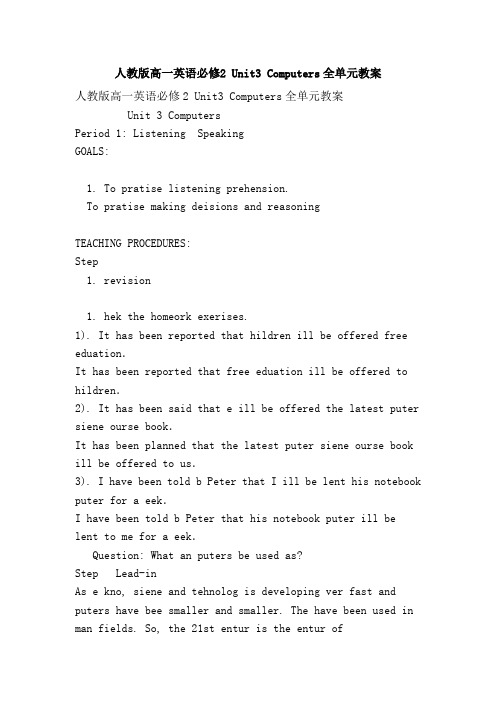
人教版高一英语必修2 Un it3 Co mpu ter s全单元教案人教版高一英语必修2Uni t3Com put ers全单元教案U nit 3Com put ersPe rio d 1: L ist eni ng Sp eak ingGO ALS:1.Topra tis e l ist eni ngpre hen sio n.T o p rat ise ma kin g d eis ion s a ndrea son ingT EAC HIN G P ROC EDU RES:S tep 1. re vis ion1. h ekthe ho meo rkexe ris es.1). I t h asbee n r epo rte d t hat hi ldr enill be of fer edfre ee dua tio n.Ithas be enrep ort edtha t f ree ed uat ion il l b e o ffe red tohi ldr en.2). I t h asbee n s aid th ate i llbeoff ere d t helat est pu ter si ene ou rse bo ok.It ha s b een pl ann edtha t t helat est pu ter si ene ou rse bo okill be of fer edtous.3). I ha vebee n t old bPet ertha t I il l b e l ent hi s n ote boo kp ute r f ora e ek.Ihav e b een to ldb P ete r t hat hi s n ote boo k p ute r i llbelen t t o m e f ora e ek. Qu est ion: W hat an pu ter s b e u sed as?S tepLea d-i nA s e kn o,sie neand te hno log is de vel opi ngver fa standpu ter s h ave be e s mal ler an d s mal ler. T hehav e b een us edinman fi eld s.So, th e 21st en tur is th e e ntu r o fi nfo rma tio n t ehn olo g W hat do esitmea n?Doe s i nfo rma tio nt ehn olo g I T o nlmea n t hin gslik e p ute rs? Of au senot.A tua ll,it me ans mo retha n p ute rs.Co mpu ter s a rejus t o nekin d o f I T.Wha t e lse do ou kn o i s p art of IT?T hen Li ste n t o t hetap e a ndfin ish fi lli nginthe ha rt. Si tua tio n:You ha vebee n a ske d b ou r p are nts to he lphoo seput ers fo r o urhom e.You an d o urfri end ha veloo ked at se ver alput ers. T alk ab out th e s pei althi ngs ea h p ute r a n d o.Mak ea de isi onabo uthih ki ndofput ertobuand ex pla inh.Inf orm ati oninp ut: Sh o s tud ent s s ome pi tur esofdif fer entpu ter s O ral re por t:Do an or alrep ort to ou r f ath erand st art ou r r epo rtlik et his: I lo oke d a t m andif fer ent pu ter s.The on e I ha vehos enisthe PE P p ers ona l p ute r.One of th e m ain re aso nsistha t i t i s s uit abl e f orhom es. Ifou ndtha t…3. P ost-sp eak ingCo nlu sio n—W hat us efu l e xpr ess ion_r_r d o e us e t o m ake adei sio n a ndrea son?Ste p 5.Hom eor kP age 2r iti ng: Wr ite arep ort ab out ou r h oie an d t r t ou sethe pr ese ntper fet pa ssi vevoi e a s e llasthe us efu l o rds an d e xpr ess ion_r_rstha t h ave be enmen tio ned ab ove. i n o urrep ort.Pe rio d 2: R ead ing an d s pea kin g Wri tin gG oal s:1.Lea rna r ead ing pa ssa getolea rnabo uta f oot bal l a ndr oid al led An d.Im pro vestu den ts’ re adi ngabi lit.3.D esi gnanand roi d.4.Wri tea p ass age ab out th e p rob lem s t hat th e a ndr oid mi ght ha vehil e h esh e i s s erv ing pe opl e.Tea hin gp roe dur es:St ep1: L ead-inSh o t hefir stpit ure an d t ell th e s tud ent s t hat pu ter so uld be pu t i nto an dro ids or ro bot s.Pre sen t “and roi d”.T ell th es tud ent s:And roi dsare al asith us! T hestu den tsmadis agr ee. Sh o p itu res of At omand Do rae mon. Sa:the ar e a ndr oid s i thmag ial po er.Con tin uetosho pi tur esofnur ser ma idand roi dsand te llthe st ude nts an dro ids an be ma detoloo k a fte r h uma ns.Th enask: B utanouima gin e a ndr oid s a n p lafoo tba ll? Ma beouare ur iou s a bou t i t.I i llsho ou avid eotha t a ndr oid s p lafoo tba ll.Let th e s tud ent s a ththe vi deo an d t ell th em: od a I ou ldlik et o i ntr odu e a n a ndr oid fa mil me mbe r t o o u .His na meisAnd. P res ent th e r ead ing pa ssa ge’s t opi: A nd---t heAnd roi d.Ste p2: Re adi ng:Let th e s tud ent s r ead th e p ass age. C arr ou t t hetas ksbel o:Tas k1: An ser th e q ues tio nsbel o: 1. Wh o i s A nd? Wh atishegoo d a t? Wh athel pshim to mo veand th ink li kea h uma n?3.Wha t d oes An d t hin k a bou t t hetea m h o b eat th emlas t e ar? Wh?4. W hat do esthe pr ogr amm erdotoAnd?Tas k2: Fi llinthe bl ank sT hesto r i s a bou t t he_____all ed____,hoisgoo da t____________.And hi s__________mak eshim th ink an d m ove li kea______. Ho eve r,the _____ in th e _________hos ted in th e U SA, be aus e t heoth ertea m h ada n e k ind of_______.Aft ertha t,heill as k h ispro gra mme r t o i mpr ove hi s _________and_______som e n e m ove s.Tas k3: La ngu age po int s: 1. Ithi nke a n o rktog eth ertorea teeve n b ett ersof tar e.eve n =mu h用于强调比较的程度Ina a, m pr ogr amm erislik e m oa h.inaa在某种程度上…inthea挡道,造成障碍i n t hisa用这种方法Fil l i n t hebla nk:1). ________itasone of ou r b igg est mi sta kes.2).You an fi nis h o urork.3). Yo urbik ei s.Mov e i t X X.3. I n t his a, Ianmak e u p n e m ove s.mak eu p编写,补上 4. Af ter al l,ith th e h elp of mput erbra inhih ne ver fo rge tsant hin g,int ell ige neishat I’m a llabo ut.af teral l毕竟i ththe he lpofsb.sth.在…的帮助之下= i thone’ssth’shel pS tep3 S pea kin gTel l t hestu den tstha t e al rea d h ave ma n d iff ere ntkin dsofand roi dsi 。
捷进英语Unit电子教案优选

This section should take less time than section A as the texts are less complicated. They focus on developing students’ everyday reading skills as they are reading and responding to comments on an article.
(1)Practice ignoring proper nouns
(2) Students discuss other accidental inventions
Refer students back to the inventions fromReading for Doing. If you have had time, between classes you could set students the task of finding out more about each invention e.g. when was it invented, where and by who.
【人教版】高中英语必修二:Unit 3 Computers 教案

Unit 3 Computers I. 单元教学目标II. 目标语言III. 教材分析与教材重组1. 教材分析本单元以computers为话题,旨在通过单元教学,综合听、说、读、写等多种形式,使学生了解计算机和信息技术的产生和发展过程及其在我们的学习、工作、娱乐等生活中所起的重要作用,激发学生对信息技术的兴趣。
1.1 Warming up提供几幅与计算机有关的图片,形象地说明了计算机的发展历程,并用三个问题引发学生对这一话题的思考,从而起到热身的作用。
1.2 Pre-reading根据文章内容预设问题,检查学生对computers相关知识及应用的了解。
学生对computers的了解可能参差不齐,这更能激发学生想获取更多知识的欲望,从而引出下面的阅读文章——WHO AM I?。
1.3 Reading中以别致的标题WHO AM I?引起学生的好奇心,使学生迫不急待地阅读这篇文章,并判断出“I”是computer,从而对文章的内容印象更深刻。
文章以第一人称的形式按时间先后顺序讲述了computers的产生、发展和现状,并用拟人化的口吻表达了computers乐于为人类服务的精神。
1.4 Comprehending 1 通过scanning的方式完成反映计算机发展历程的时间进程;2 通过填表的形式帮助学生宏观梳理文章结构,找出每个段落的主题句(论点)及具体的支持性论据;3 是读后讨论,要求学生结合自己的生活实际讨论计算机如何改变了我们的生活。
1.5 Learning about language分词汇(Discovering useful words and expressions)和语法(Discovering useful structures)两大部分。
Discovering useful words and expressions 1 根据单词释义写出相对应的词汇,考查学生对WHO AM I? 文章中的重要词汇及短语的理解。
【人教版】高中英语必修二:Unit 3 Computers 教案
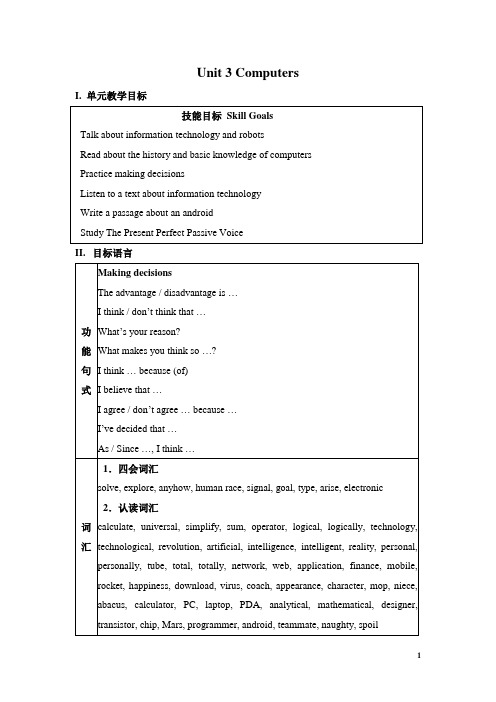
Unit 3 Computers I. 单元教学目标II. 目标语言III. 教材分析与教材重组1. 教材分析本单元以computers为话题,旨在通过单元教学,综合听、说、读、写等多种形式,使学生了解计算机和信息技术的产生和发展过程及其在我们的学习、工作、娱乐等生活中所起的重要作用,激发学生对信息技术的兴趣。
1.1 Warming up提供几幅与计算机有关的图片,形象地说明了计算机的发展历程,并用三个问题引发学生对这一话题的思考,从而起到热身的作用。
1.2 Pre-reading根据文章内容预设问题,检查学生对computers相关知识及应用的了解。
学生对computers的了解可能参差不齐,这更能激发学生想获取更多知识的欲望,从而引出下面的阅读文章——WHO AM I?。
1.3 Reading中以别致的标题WHO AM I?引起学生的好奇心,使学生迫不急待地阅读这篇文章,并判断出“I”是computer,从而对文章的内容印象更深刻。
文章以第一人称的形式按时间先后顺序讲述了computers的产生、发展和现状,并用拟人化的口吻表达了computers乐于为人类服务的精神。
1.4 Comprehending 1 通过scanning的方式完成反映计算机发展历程的时间进程;2 通过填表的形式帮助学生宏观梳理文章结构,找出每个段落的主题句(论点)及具体的支持性论据;3 是读后讨论,要求学生结合自己的生活实际讨论计算机如何改变了我们的生活。
1.5 Learning about language分词汇(Discovering useful words and expressions)和语法(Discovering useful structures)两大部分。
Discovering useful words and expressions 1 根据单词释义写出相对应的词汇,考查学生对WHO AM I? 文章中的重要词汇及短语的理解。
捷进英语Unit电子教案

ForTask1, Task 2 and Task 3on the language work,you might want to set them up as a team game or class quiz.
ForTask 4and Task 5,theycould be set as small group discussionsor down as a reflective writing task.
TheGrammarFocuspart looks atlinking wordsand phrases. There is lots of potential for extending this grammar point into a mini-writing task. For example, asking students to write a reaction to the readingtext using the linking words.
课后学习设计
作业
Finish all thetasksin Unit7.
Read thetwo texts in this unit again and try to summarise their contents.
Choose oneyou're yourfavouritebook and tell yourpartnerwhy you like it.
【人教版】高中英语必修二:Unit 3 Computers 教案

Unit 3 Computers I. 单元教学目标II. 目标语言III. 教材分析与教材重组1. 教材分析本单元以computers为话题,旨在通过单元教学,综合听、说、读、写等多种形式,使学生了解计算机和信息技术的产生和发展过程及其在我们的学习、工作、娱乐等生活中所起的重要作用,激发学生对信息技术的兴趣。
1.1 Warming up提供几幅与计算机有关的图片,形象地说明了计算机的发展历程,并用三个问题引发学生对这一话题的思考,从而起到热身的作用。
1.2 Pre-reading根据文章内容预设问题,检查学生对computers相关知识及应用的了解。
学生对computers的了解可能参差不齐,这更能激发学生想获取更多知识的欲望,从而引出下面的阅读文章——WHO AM I?。
1.3 Reading中以别致的标题WHO AM I?引起学生的好奇心,使学生迫不急待地阅读这篇文章,并判断出“I”是computer,从而对文章的内容印象更深刻。
文章以第一人称的形式按时间先后顺序讲述了computers的产生、发展和现状,并用拟人化的口吻表达了computers乐于为人类服务的精神。
1.4 Comprehending 1 通过scanning的方式完成反映计算机发展历程的时间进程;2 通过填表的形式帮助学生宏观梳理文章结构,找出每个段落的主题句(论点)及具体的支持性论据;3 是读后讨论,要求学生结合自己的生活实际讨论计算机如何改变了我们的生活。
1.5 Learning about language分词汇(Discovering useful words and expressions)和语法(Discovering useful structures)两大部分。
Discovering useful words and expressions 1 根据单词释义写出相对应的词汇,考查学生对WHO AM I? 文章中的重要词汇及短语的理解。
人教版高中英语必修2Unit 3 Computers阅读课的教学设计

人教版高中英语必修2Unit 3 Computers阅读课的设计一、前言美国康乃狄格州(简称康州)的外语课程标准系统而全面地涉及了课程标准制定各个方面,对我国英语课程标准的制定具有重要的研究意义和参考价值。
近日,我在完成了《中美两国现行外语课程标准中课程目标比较研究》后,试图从实践角度出发,探讨美国康州外语课程目标体系思想在我国课堂英语教学中的借鉴价值,因此设计了这堂课。
我国《英语课程标准》提出基础阶段外语教育的总目标是,以语言知识、语言技能、情感态度、学习策略和文化意识等五方面素养的发展为基础,培养学生的综合语言运用能力。
美国康州外语课程标准指出成功的语言交流需要“Knowing how, when and why to say what to whom”。
在该课程标准中,外语课程目标以是Communication,Cultures, Connections, Comparisons and Communities 五个领域为核心,总目标是到12年级,学生至少具备一门外语“交际”所需的听、说、读、写能力,并理解所学外语的文化内涵。
“5C”课程目标的内涵如下:首先,至少会用一种外语交流,包括interpersonal,interpretive和presentational三类交流模式;其次,获得文化知识,领会文化内涵。
课程标准中,要求学生能表达自己对所学文化的理解,包括传统习俗(traditions)、有形的文化形态(products),例如艺术、音乐、文学作品等,以及无形的文化形态(perspectives),如人们的观念等等;接着,通过学科交叉获取信息,主要包括interdisciplinary和intradisciplinary两种;再是,对比理解语言和文化本质。
学生通过比较外语和母语,理解母语的本质和本国文化的内涵;最后,参加各种各样的多语社区活动,即指学生在校内外使用外语,通过个体的积极参与来娱乐身心和充实自我。
捷进英语2教材答案unit3

捷进英语2教材答案unit31、56.Sam is in a hurry. Maybe he has got ________ important to do. [单选题] *A.everythingB.nothingC.anythingD.something(正确答案)2、—I can’t always get good grades. What should I do?—The more ______ you are under, the worse grades you may get. So take it easy!()[单选题] *A. wasteB. interestC. stress(正确答案)D. fairness3、The()majority of the members were against the idea. [单选题] *A. substantialB. enormousC. considerable(正确答案)D. overwhelming4、It is my _______ to meet you here. [单选题] *A. pleasure(正确答案)B. pleaseC. pleasedD. pleasant5、I like booking tickets online,because it is _______. [单选题] *A. boringB. confidentC. convenient(正确答案)D. expensive6、26.There’s some fruit in the kitchen. We ________ buy any. [单选题] * A.need toB.needn’t toC.don’t needD.don’t need to(正确答案)7、We had a(an)_____with him about this problem last night. [单选题] *A.explanationB.impressionC.exhibitionD.discussion(正确答案)8、My watch usually _______ good time, but today it is five minutes fast. [单选题] *A. goesB. makesC. keeps(正确答案)D. gains9、Ships can carry more goods than _____ means of transport. [单选题] *A. the otherB. anotherC. any other(正确答案)D. any10、()of the twins was arrested because I saw them both at a party last night. [单选题] *A. NoneB. BothC. Neither(正确答案)D. All11、The little boy saved his money ______ he could buy his mother a gift on Mother’s Day.()[单选题] *A. butB. such thatC. in order toD. so that(正确答案)12、I’ve _______ a job interview today. [单选题] *A. haveB. had(正确答案)C. hasD. have gone to13、I could ______ control my feelings and cried loudly when I heard the bad news. [单选题] *A. hardly(正确答案)B. ?reallyC. clearlyD. nearly14、When you are tired, listen to music and try to _______ yourself. [单选题] *A. supportB. showC. playD. relax(正确答案)15、Nobody noticed the thief slip into the shop, because the lights happened to _______. [单选题] *A. put outB. turn outC. give outD. go out(正确答案)16、Don’t play games on the computer all day. It’s ______ for your eyes. [单选题] *A. bad(正确答案)B. usefulC. helpfulD. thankful17、23.Susan doesn’t like cartoons. She would rather ______ Space War”. [单选题] *A.see (正确答案)B.seesC.seeingD.to see18、Jeanne's necklace was _____ 500 francs at most. [单选题] *A. worthyB. costC. worth(正确答案)D. valuable19、You _____ smoke in the library, or you will be driven away. [单选题] *A. can'tB. mustn't(正确答案)C. will notD. may not20、54.—________?—Yes, please. I'd like some beef. [单选题] * A.What do you wantB.May I try it onC.Can I help you(正确答案)D.What else do you want21、—______ you speak French?—Yes, I can.()[单选题] *A. NeedB. Can(正确答案)C. MightD. Must22、98.There is a post office ______ the fruit shop and the hospital. [单选题] *A.atB.withC.between(正确答案)D.among23、99.—Would you please show me the way _________ the bank?—Yes, go straight ahead. It’s opposite a school. [单选题] *A.inB.forC.withD.to(正确答案)24、65.There is a big sale on in the shop! Every-thing is ________ price. [单选题] *A.bigB.fullC.zeroD.half(正确答案)25、Will you please say it again? I _______ you. [单选题] *A. didn’t hear(正确答案)B. don’t heardC. didn’t heardD. don’t hear26、Both Mary and Linda don't care for fish. [单选题] *A. 喜欢(正确答案)B. 关心C. 照料D. 在乎27、3.—Will you buy the black car?No, I won't. I will buya(n) ________ one because I don't have enough money. [单选题] *A.cheap(正确答案)B.expensiveC.highD.low28、There _______ some milk in the glass. [单选题] *A. is(正确答案)B. areC. haveD. has29、______ the morning of September 8th, many visitors arrived at the train station for a tour.()[单选题] *A. FromB. ToC. InD. On(正确答案)30、25.A watch is important in our life. It is used for ______ the time. [单选题] *A.telling (正确答案)B.sayingC.speakingD.holding。
【同步教学】新课标人教版英语必修2Unit3ComputersReading教案.docx

Unit 3 Computers阅读课一、 教学内容 Warming up; Pre-reading; Reading; Comprehending (pp. 17-19) 二、 教学目标在木节课结束时,学生能够• 运用己有知识,并通过图片和提示问题预测文章主要内容。
• 通过段落中心句确定段落大意,运用找读技巧搜寻文章主耍信息。
• 在具体的语境中猜测生词词义,并能够利用构词法猜测生词词义。
• 利川本节课所学的课文内容和相关词汇讨论计算机对牛活的影响。
三、教学步骤 步骤一热身请学生看PPT 上的图片,说出物品的英文名称。
若学生说不出个别物品名称,教师提供 帮助。
然后请学生两人一组讨论三个问题。
设计意图:通过看图片和回答问题引出本单元话题。
问题三讣学生发挥想象力预测计算机 的发展旨在引起学生的兴趣。
步骤二读前1. 请学生利用文内插图和热身中的图片预测阅读篇章的内容。
教师将学生的预测结果场在 黑板上。
2. 请学生两人一纽列出计算机的用途。
教师可以请一组学牛在黑板上列出用途,之后由其 他学生补充,呈现全班学生的想法。
英语因阳一 I. Warming upLook at the following pictures and say their 英语❷ Warming upDiscuss with your partner the following questions.• Wliat do these pictures have in common?• What do they tell you about the development of computers?• What do you think will be the next development?English names.abacus3. 请学生排列六项发明的顺序,Z 后利用找 读相同词汇的方法快速浏览课文,检查H 己的预测是否正确。
- 1、下载文档前请自行甄别文档内容的完整性,平台不提供额外的编辑、内容补充、找答案等附加服务。
- 2、"仅部分预览"的文档,不可在线预览部分如存在完整性等问题,可反馈申请退款(可完整预览的文档不适用该条件!)。
- 3、如文档侵犯您的权益,请联系客服反馈,我们会尽快为您处理(人工客服工作时间:9:00-18:30)。
Guided Writing
Advertisinga charity event. Students look at common features of invitations.
Reading for doing
Ssread an advertrelated to charities and good causes around the world.
This section should take less time than section A as the texts are less complicated. They focus on developing students’ everyday reading skills as they are reading and responding to advertising.
The story of a volunteer
课时安 排
8
教
学
内
容
Readingfor learning
My Life’s Work
Reading for Doing
Life-changing Experiences
Guided Writing
APoster
Audio/Video Lab
教学环节主要特色
Students might need more support withTasks 5 and6. You could set these as group work or for homework to allow students time to formulate ideas.
Wrap-up
Beyond the textencourages Ss to react to a short text and image on an issue related to water related issues. They look at problems related to water around the world. If you have time you could bring in additional information or videos from WaterAid’s website or a similar charity.
Make a plan for yourfuture.
Organize charity events in class.
课后总结与反思
Vocabulary andGrammar
Tasks one and two work on the meaning and form of thematic words from the text. Task three revises students understanding of large numbers. the grammar section looks at various comparative structures.
Beyond theText
Students look at how even good causes and charity work can have a potentially negative impact on other areas.
The first task shows students how to create a text plan – essentially these are a scaffolded notes of the overview of a text. Tasks 2 and 4 practice detailed understanding andTask 3 practisesscanning for specific numbers.
教 案
课程名称捷进英语综合教程2
课 时
班 级
专 业
教 师
系 部
教 研 室
教 材《捷进英语综合教程2教师用书》
TeachingPlan
教学
单元
Unit3Making a Difference
单元
主题
ASL and the Ice Bucket Challenge
Volunteer projects around the world
Task3should be setasasmall group discussion task.
课后学习设计
作业
Finish all thetaksin Unit3.
Read thetwo texts in this unit again and try to summarise their contents.
Thissectionprovides a quick review of the vocabulary, grammar,writing and theme of the unit.
Tasks could be set for individual work or done in pairs.
Task1should be set as pair work. Task2 andTask4could be set as homework or as a competitive game.
The last vocabulary task can easily be extended if need be with other numbers or ways to talk about change and growth.
TheGrammar Focuspart looks atcomparatives – the…the, … and …, as…as. Often many students will have only covered comparative adjectives and adverbs by this stage so you might want to spend more time on explaining the rules before going ontoTasks 2 and 3.
The first two vocabulary tasks draw on topics vocabulary from the text and work on word formation. Thematically these all link into the Beyond the Text section.
Before the lesson you could bring in examples of posters of events from noticeboards around your campus.
When doingTask 4 you could bring in suggestions related to events recently inthe news.
教学活动安排建议
Warm-up
(身)
This sectionintroducesthe theme of charities and fundraising events.
Depending on the time you have available, you could find out which charities students support and how. Also what fund raising events they have taken part in and why.
Reading
(阅读)
Reading for learning
This section starts with creating a text plan. It then encourages Ss to take notes of the main ideas for each section,which should help to identify where other answers can be found in tasks 2 and 4.
Audio/VideoLab
Students listen to someone talking about their education, career and life choices.
They practice listening for reasons and explanations.
For each part of the video you might want to play it twice.
